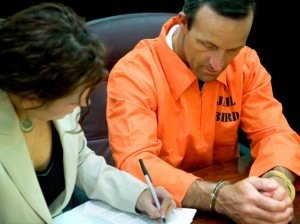 Forensic psychology is the branch of psychology that is applied to the criminal justice sector. It is basically a bridge between the study of psychology and law, as a forensic psychologist will often be asked to testify in a courtroom and provide assessment of the defendant’s sanity or insanity. In a way forensic psychology is all about translating scientific psychological information into useful legal information.
Forensic psychology is the branch of psychology that is applied to the criminal justice sector. It is basically a bridge between the study of psychology and law, as a forensic psychologist will often be asked to testify in a courtroom and provide assessment of the defendant’s sanity or insanity. In a way forensic psychology is all about translating scientific psychological information into useful legal information.
Most people think that forensic psychologists are involved in crime scene analysis and profiling like the shows on TV – however maybe only a handful engage in this kind of work. For that matter, the portrait profile of a forensic psychologist in popular media is distorted and far from the real image – I blame series and movies here.
What does a forensic psychologist do?
A forensic psychologist is concerned with collecting, examining and ultimately presenting evidence for judicial purposes – psychological data, of course. This occurs when an attorney or a judge requests that a professional psychologist testifies in court to help assess a defendant’s competency and/or any relevant traits.
The process of forensic psychological analysis is typically applied through an evaluation. However, take note, that it’s significantly different from clinical psychological analysis, which often involves seeing the situation from the client’s point of view or “empathizing”, and which doesn’t enter in the scope of forensic psychology. This is because the traditional psychology analysis is flawed when put in a forensic setting.
A forensic psychology needs to assess the consistency of factual information across multiple source, and provide the source on which any information is based. It’s common for a defendant to plead insanity, as a general mental state or at the time the crime in question was made, and as such a forensic psychologist needs to tell a malingering or feigning illness apart from the genuine cases.
 Probably, the most important part on a forensic psychologist’s agenda is courtroom testimonial. This is actually the segment of the job where it becomes most demanding, and most evidently apart from other forms of traditional branches of psychology. A forensic psychologists needs to have a firm grasp of the law and the legal situation at issue in the courtroom.
Probably, the most important part on a forensic psychologist’s agenda is courtroom testimonial. This is actually the segment of the job where it becomes most demanding, and most evidently apart from other forms of traditional branches of psychology. A forensic psychologists needs to have a firm grasp of the law and the legal situation at issue in the courtroom.
A forensic psychologist may act as an expert witness in the setting of a family court (Child Custody Evaluations, Visitation Risk Assessments, Grandparent Visitation Evaluations, Mediation of Parental Conflicts about Children, Child Abuse Evaluations, Adoption Readiness Evaluations, Development of Family Reunification Plans, and Evaluations to Assess Termination of Parental Rights), civil court (Personal Injury Evaluations, IME Second Opinion Evaluations, Assessment of Emotional Factors in Sexual Harassment and Discrimination, Worker’s Compensation Evaluations, Civil Competency Evaluations, and Psychological Autopsies) or criminal court (Evaluations of Juveniles accused of criminal acts, Juvenile Pre-sentencing Evaluations, Juvenile Probation Evaluations, Juvenile Waiver Evaluations, Evaluating the Credibility of Child Witnesses, Assessment of Juvenile and Adult Sexual Offenders, Competency and Diminished Capacity Evaluations, and Adult Pre-sentencing Evaluations.).
Forensic psychology is also the basis for behavioral analysis, which serves to provide law enforcement with a profile of an unknown criminal subject. Real life criminal profilers specialize assisting in the quick capture of criminals by providing psychological profiles. This is why a forensic psychologist is often contacted by law enforcement agencies to provide training on criminal behavior and victim identification.
Working as a forensic psychologist is both a rewarding and a challenging field of practice for licensed psychologists.
Forensic Psychology Resources


